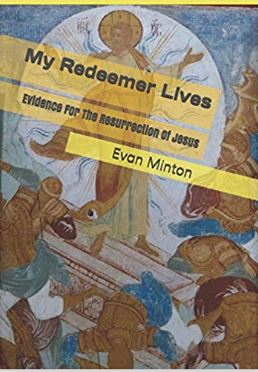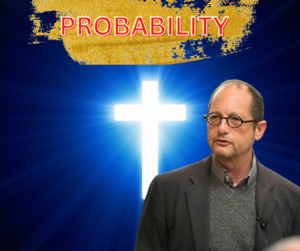Recently, The Capturing Christianity Facebook Page posted “What is your favorite argument For Christianity?” I said that The Minimal Facts Argument For Jesus’ resurrection is.
And then This Conversation Ensued…
Then Christ Hansen commented
“Ugh minimal facts is just an argumentum ad populum that chooses not to critically deal with dissenting scholarship that is in the mainstream. Hence why it is an apologist favorite and why no critical scholars use it. Just Habermas. Notice real arguments for resurrection by critical scholars like Licona or Wright take up hundreds and hundreds of pages and still dont come to solid conclusions on the matter.”
Now, if that name rings a bell, it’s probably because you’ve been to the debate section of this website and watched the debate I had with him on The Moral Argument.
I responded
“Chris, I see that you have no understanding whatsoever of how the argument is used. The Minimal Facts doesn’t argue that the minimal facts ARE facts because “The vast majority of scholars affirm that these are true”. Rather, the MF proponent says “I’m just going to restrict my case to using only those facts that are accepted in the mainstream.” We then go on to actually use arguments from the criteria of authenticity to establish each of the facts. Once the facts are place, a look at what best accounts for them takes place.
I recommend picking up a copy of my book ‘My Redeemer Lives: Evidence For The Resurrection Of Jesus’.
Moreover, it isn’t just Habermas that uses it. Licona uses it as well. In fact, the book in which I first learned about the MF was a book Licona co-wrote with Habermas. Licona doesn’t restrict himself to the MF approach, but he doesn’t disavow its usage.”
Chris Hansen then said
“Actually I have a very good understanding of how it is used.
Also I did read your book. And found its methods and conclusions horribly suspect and uncritical.
Your book was that of someone unwilling to have a single critical outlook on your religious text.”
I then said
“Wow. That’s harsh. I would even say uncharitable. It’s a 300-page book, so I’m not going to ask you specifically, what flaws you found in my evidential case, but perhaps you’d be willing to do a blog series on your Biblical Atheist website at some point.
Perhaps I need to retract some arguments or tweak others, or substantiate hidden premises underlying some assumptions. Or maybe the case is sound and your reasons for rejecting it are fallacious. In any case, I’d like to know why you didn’t find my case for Christ convincing.
Again, I don’t expect you to do that here in a Facebook comment section. This isn’t the place for such in-depth scholarly interaction. But a blog series would be good.”
Then he said this
“Actually it is 217 pages…
Regardless, I am going to be writing my own work countering many of these apologetics arguments.Now I am not going to argue the resurrection didn’t happen and I don’t have an issue with people believing it. But I find the Minimal Facts argument by itself to be highly suspect. I find the Criterion based arguments (Embarrassment, Dissimilarity, etc) to also be methodologically dubious on numerous grounds.
But one example will be when you argue multiple attestation for Jesus’ crucifixion you cite Mara Bar Serapion (who doesn’t actually attest to crucifixion but an ambiguous death). But you also ignore that Serapion was likely reliant on Christians for his info and may have also been very late in date (Robert Van Voorst talks about all this in his book Jesus Outside the New Testament).
Then later in another section, you state that early Christians didn’t call Jesus “king of the Jews.” Now if Mara Bar Serapion is an early source, though, then he is direct attestation that they did. Because he was likely reliant on Christians, and he calls Jesus a king of the Jews (“there [the Jews” wise king”).
Furthermore, there are actually church fathers early that do call him this, as noted by Hengel’s “Studies in Early Christology”.
Your argumentation with Mara Bar Serapion, thus, is entirely inconsistent. It shows that your Criterion of Embarrassment argument for “King of the Jews” title actually collapses, and since Serapion was probably reliant on a Christian source (as all of the Classical sources probably were, as Van Voorst notes), he is not an independent source for the crucifixion.
This is typical of your work throughout. It suffers greatly because you don’t really engage with most critical literature on the matter.”
Does Chris Hansen Have A Point?
I think Chris just misunderstood my argument. I didn’t say that the early Christians wouldn’t have called Jesus “King” in some sense, nor would I argue that they didn’t see Jesus as The King of The Jews. All I’m saying is that in early Christian writings, you don’t find the exact words “The King of The Jews” described of Jesus. In the NT epistles and early church writings, you find Jesus called “Lord”, “Son of God”, “God”, and “Messiah”, but King Of The Jews is sparse at best, and if there were sources that do use the phrase, as Hansen says (Hengel’s “Studies in Early Christology”), then I’m mistaken and I’m thankful to Chris to point that out. But even if it shows up a few times, it is still an extremely sparse designation. Dissimilarity doesn’t need a phrase to never show up in the early church writings. It just needs to be really, really rare. So conceding the point that some church fathers employed the phrase, maybe once or twice, the criterion of dissimilarity still applies to the crucifixion of Jesus. I’ll admit that I haven’t read that work “Studies in Early Christology”. I do try to do my due diligence and read all of the best scholarly resources I can in researching a topic, but I’m only one person and one can only read so many books. One also has to be brought to the attention that these works even exist.
Now regarding Jesus being The King of The Jews. Of course, they would have seen Jesus as “King of The Jews”. That’s just what it means to be the Messiah. But, especially Paul, wouldn’t have seen Jesus as king only of the Jews, but the king of all people! “Is God the God of Jews only? Is he not also the God of Gentiles also? Yes. Of Gentiles also.” (Romans 3:29). Since Paul believed Jesus is God (Philippians 2:5-8), and he believed God is the King of Israel (Isaiah 44:6), then he would have naturally seen Jesus as King. Much like Kanye West does. What I’m arguing is that the precise title, worded as such “King of The Jews” sparsely appears. That makes it dissimilar.
Hansen says \” Now if Mara Bar Serapion is an early source, though, then he is direct attestation that they did. Because he was likely reliant on Christians, and he calls Jesus a king of the Jews (“there [the Jews” wise king”)\ — I find the argument that because Mara calls Jesus “their king” that therefore he was reliant on Christian sources to be dubious. Yes, he likely knew what Christians believed, but that isn’t the same as using someone else’s source. For example, most scholars acknowledge that the author of the gospel of John likely knew of the three synoptic gospels. It is written long after the Synoptics (regardless of whether you accept the liberal or conservative dating) and the Synoptics had circulated so widely by then that it would astonishing if John weren’t aware of them. Nevertheless, no historian says that John was reliant on the other three for his work. They do make this argument in many cases regarding the Synoptics (i.e they say Matthew and Luke drew upon Mark), but they don’t make this claim with John. This is because John’s work is so unlike the Synoptics, includes so many events and sayings of Jesus not found in any of the Synoptics, and John’s Jesus “sounds” so different from the synoptic Jesus, that the idea that he was using them as a source doesn’t attract a lot of scholarly attention.
To use a modern analogy, pretty much everyone knows the events that transpired on 9/11, and everyone has seen Fox News and CNN’s coverage of it. And Fox was aware of CNN’s reporting and vice versa. Yet, who would say that, because they were aware of what the other knew, that Fox used CNN to get their information about what happened? I think most of us would say Fox and CNN reported the events of 9/11 independently of one another. For Multiple Attestation, does author A need to be completely and utterly ignorant that Author B has written on this? Or does he just simply need to use different sources, either his own memory (if he’s an eyewitness) or to have consulted a different person who was there? I have never heard any scholar argue the former, only the latter.
Finally, even if Mara wasn’t an independent source, this wouldn’t hurt the argument from multiple attestation. Jesus’ death by crucifixion would still be attested by Josephus, Tacitus, Lucian Of Samosata, The Apostle Paul, Mark, John, and The Jewish Talmud. Even if we conceded everything that Chris Hansen said, it would just eliminate one source out of the plethora of sources we have for Jesus’ death. I don’t need all 9 sources. In fact, I can just make a case for multiple attestation with a minimum of 2. If just two independent historians attest to an event, that it multiple attestation. However, the more and more sources you have, the less and less likely said event is made up.
In the introduction to my book, I admonished the reader to not throw the baby out with the bathwater. I wrote that even if they find one or two points unpersuasive or even one argument unpersuasive, to consider the case as a whole. I’ll quote myself “
I think that Christianity can be proven “beyond a reasonable doubt”. However, maybe you personally don’t think the evidence I will present in this book matches that standard. Maybe you think the evidence simply meets lower SOPs like “the preponderance of the evidence” (i.e it’s more likely than not that Christianity is true). I will leave that up to you. Some people consider some arguments more convincing than others. You may not agree with every point I make in this book. Nevertheless, I want you to consider the overall case for Christ. For example, several chapters from now, I will be making 9 independent arguments that Jesus’ death by crucifixion is a historical fact. Let’s say you find 2 or 3 arguments unpersuasive. Still, should that dissuade you from thinking that Jesus’ death on a Roman cross is a historical fact? Not if you think 3 or 4 of them are good! You can say ‘You know, I find arguments 1, 3, 5, and 6 overwhelmingly powerful, but the rest are pitiful.’ That’s fine. I just don’t want you to throw the baby out with the bathwater. Don’t think that because you find 1 or 2 arguments unpersuasive that therefore, Jesus’ execution or His empty tomb aren’t facts. Only if you find them all unpersuasive can you say ‘I don’t think you established the minimal fact'”. (page 10)
Conclusion
This is only a taste of what I can bet would be a lengthy critique of my book My Redeemer Lives: Evidence For The Resurrection Of Jesus. I am interested in what Hansen thinks. I can only benefit from having my beliefs and arguments challenged. I’ll either be shown that I’m terribly mistaken and need to change views (and this has happened several times on several different subjects) or my confidence will be reinforced if the responses aren’t very good. Doubt or solidification are the only roads I can go down when challenged.
I do hope he’ll write a more in-depth response to my work. Perhaps even have a written debate with me on the subject, or what some of my friends like to call “A Blog War”. Discussing the contents of a book would be too much for a live debate, but I’d love to have a written debate with him.






